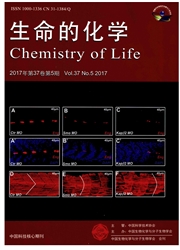

 中文摘要:
中文摘要:
哺乳动物雷帕霉素靶蛋白(mammalian target of rapamycin,mTOR)是一种非典型丝氨酸/苏氨酸蛋白激酶,可整合营养、能最及生长闲予等多种细胞外信巴,参与基因转录、蛋白质翻译、核精体合成等生物过程,杠细胞生长和细胞程序性死亡中发挥极为蘑要的作用。研究表明,mTOR信号通路可能通过调节下游靶蛋白来调控细胞生物过程,如缺氧诱导因子(hypoxia—induciblefactr,HIF-1α),血管内皮生长因子(vascular endothelial growth factor.VEGF)等。mTOR通过调节这些细胞因子,可能影响蛋白质合成、血管生成和细胞凋亡自噬等,从而影响疾病发展和结局,这为mTOR成为疾病治疗靶点提供证据。
 英文摘要:
英文摘要:
The mammalian target of rapamycin (mTOR) is an evolutionarily conserved atypical Ser/Thr protein kinase, functioning as a sensor of extracellular signals from nutrients, oxygen, energy and growth factors. Through modulating its downstream targets in the cellular nucleus, roTOR regulates transcription, cell growth, protein translation, proliferation, survival and programmed cell death. It is proved that mTOR can regulate the cellular biological processes through some cytokines, such as hypoxia-inducible factor (HIF-1α), vascular endothelial growth factor (VEGF), etc. These processes include protein synthesis, angiogenesis, apoptosis or autophagy, which participate in the pathological or survival mechanisms of diseases. Therefore, roTOR could become a candidate target for treatment of diseases.
 同期刊论文项目
同期刊论文项目
 同项目期刊论文
同项目期刊论文
 MiR-139-5p inhibits HGTD-P and regulates neuronal apoptosis induced byhypoxia-ischemia in neonatal r
MiR-139-5p inhibits HGTD-P and regulates neuronal apoptosis induced byhypoxia-ischemia in neonatal r MiR-199a-3p Inhibits Aurora Kinase A and Attenuates Prostate Cancer Growth New Avenue for Prostate C
MiR-199a-3p Inhibits Aurora Kinase A and Attenuates Prostate Cancer Growth New Avenue for Prostate C Microarray Profiling and Co-Expression Network Analysis of LncRNAs and mRNAs in Neonatal Rats Follow
Microarray Profiling and Co-Expression Network Analysis of LncRNAs and mRNAs in Neonatal Rats Follow Biological characteristics of prostate cancer cells are regulated by hypoxia-inducible factor 1 alph
Biological characteristics of prostate cancer cells are regulated by hypoxia-inducible factor 1 alph Involvement of the Akt-GSK-3β-CRMP-2 pathway in axonal and dendritic injury after hypoxic-ischemic b
Involvement of the Akt-GSK-3β-CRMP-2 pathway in axonal and dendritic injury after hypoxic-ischemic b Targeting Hypoxia Inducible Factor-1 alpha: A Novel Mechanism of Ginsenoside Rg1 for Brain Repair af
Targeting Hypoxia Inducible Factor-1 alpha: A Novel Mechanism of Ginsenoside Rg1 for Brain Repair af In Vitro Effects of Hypoxia-Inducible Factor 1 alpha on the Biological Characteristics of the SiHa U
In Vitro Effects of Hypoxia-Inducible Factor 1 alpha on the Biological Characteristics of the SiHa U Signaling pathway involved in hypoxia-inducible factor-1 alpha regulation in hypoxic-ischemic cortic
Signaling pathway involved in hypoxia-inducible factor-1 alpha regulation in hypoxic-ischemic cortic Influence of hypoxia-inducible factor 1-alpha on neuronal apoptosis in a rat model of hypoxia- or hy
Influence of hypoxia-inducible factor 1-alpha on neuronal apoptosis in a rat model of hypoxia- or hy The neuroprotective role of TERT via an antiapoptotic mechanism in neonatal rats after hypoxia-ische
The neuroprotective role of TERT via an antiapoptotic mechanism in neonatal rats after hypoxia-ische Role of vasodilator stimulated phosphoprotein in VEGF induced blood-brain barrier permeability in en
Role of vasodilator stimulated phosphoprotein in VEGF induced blood-brain barrier permeability in en INVOLVEMENT OF THE AKT/GSK-3 beta/CRMP-2 PATHWAY IN AXONAL INJURY AFTER HYPDXIC-ISCHEMIC BRAIN DAMAG
INVOLVEMENT OF THE AKT/GSK-3 beta/CRMP-2 PATHWAY IN AXONAL INJURY AFTER HYPDXIC-ISCHEMIC BRAIN DAMAG PI3K/Akt signaling pathway is required for neuroprotection of thalidomide on hypoxic-ischemic cortic
PI3K/Akt signaling pathway is required for neuroprotection of thalidomide on hypoxic-ischemic cortic Telomerase reverse transcriptase: A novel neuroprotective mechanism involved in neonatal hypoxic-isc
Telomerase reverse transcriptase: A novel neuroprotective mechanism involved in neonatal hypoxic-isc Telomerase Reverse Transcriptase Upregulation Attenuates Astrocyte Proliferation and Promotes Neuron
Telomerase Reverse Transcriptase Upregulation Attenuates Astrocyte Proliferation and Promotes Neuron 期刊信息
期刊信息
